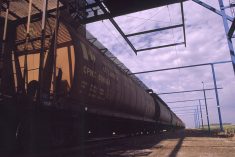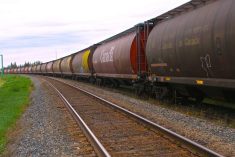Ordered to hand over more than $7 million in Prairie grain handling revenue and related fines for the 2014-15 crop year, Canadian National Railway now plans to challenge the bill in court.
Montreal-based CN on Monday filed in the Federal Court of Appeal, seeking leave to appeal the Canadian Transportation Agency’s (CTA) Dec. 29 finding that the railway had overshot its federally-mandated maximum grain revenue entitlement for 2014-15 by $6.87 million.
The CTA, in such cases, has required since 2000 that CN and/or Canadian Pacific Railway (CP) pay any such overages to the Western Grains Research Foundation (WGRF), plus a five per cent penalty. In CN’s case, that brings the total owing to just under $7.21 million.
Read Also

Alberta harvest wrapping up: report
Harvest operations advanced to 96 per cent complete in Alberta as of Oct. 7, with only a few late-seeded cereal and canola fields remaining, according to the latest provincial crop report.
CN said Monday it believes the CTA “did not apply the revenue cap properly, which erroneously caused it to conclude CN had exceeded its revenue entitlement.”
A spokesperson for CP — which is on the hook for $2.24 million in similar overages and penalties for 2014-15 — was not immediately available Monday to say whether it also plans to seek an appeal.
CN’s notice of motion on Monday also seeks a stay on payment to the WGRF, pending the outcome of the appeal. The CTA usually requires the railways, if need be, to pay up within 30 days of its ruling.
CN said Monday it had already put that payment in escrow, pending the appeal. However, CN also said in its notice of motion that the WGRF has “refused” to agree to CN’s request that the payment be kept in escrow, leaving CN “exposed to irreparable harm” if a stay of payment isn’t granted.
CN, in its notice of motion, said the CTA “refused to recognize the actual mileage over which CN moved grain” in 2014-15 and based its mileage calculation for CN on “outdated information.” CN estimated that decision impacted its revenue cap by about $5.4 million.
CN said the CTA’s calculation for 2014-15 also includes rail movements to destinations “expressly excluded” from the revenue cap provisions, including traffic to CN’s Thornton Yard and Vancouver Intermodal Terminal, both at Surrey, B.C.
Not excluding those destinations also impacted the cap, by an estimated $2.1 million, CN said.
CN also said the CTA’s treatment of rail revenue also doesn’t allow the company to be compensated for interswitching, in which one railway picks up a car at a grain elevator or siding and delivers it to another railway for the line haul. In such cases, CN said, the line haul carrier pays the switching carrier for its trip.
“As a direct result of the agency’s punitive approach to accounting for switching revenues alone, CN will have to pay almost $4 million in excess amounts and penalties” for 2014-15, the railway said.
“Procedural fairness”
The CTA said in late December its decision on CN’s revenue took into account four of six adjustments CN sought to make in September and October to the Grain Traffic Database (GTDB) after its previous filings to the database in June.
CN’s other two requested adjustments “were more complex and constitute material changes that require more detailed examination,” the CTA said.
Those two changes involve mileage between Thornton Yard and various spots in the greater Vancouver area, and between its Neebing Yard hub at Thunder Bay, Ont. and various points in the area, the agency said.
The CTA said it “intends to first consult with industry stakeholders, including railway companies, grain shippers, producer groups and associations, provincial governments and municipal associations” starting early this year, given the “potential significance” of the requested changes.
Thus, the CTA said, those two requests wouldn’t be considered in the 2014-15 revenue cap findings, but would be deferred to the agency’s decision on 2015-16.
CN, in Monday’s notice of motion, criticized that move as a “procedural fairness issue.”
CN said it “expressly raised” the issues of mileage calculations and excluded destinations ahead of the CTA’s decision in late December, but added that the CTA’s process calls for issues the agency deems “material” to be raised by April 30, in order for the agency to consider them for that crop year.
“Given that a crop year begins on Aug. 1 and ends on July 31 of each year, it is not possible for CN to predict by April 30 the issues which will arise during that crop year,” CN said. — AGCanada.com Network
















